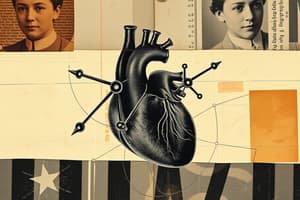Podcast
Questions and Answers
What is the primary mechanism of action of Cardizem?
What is the primary mechanism of action of Cardizem?
- Blocks calcium channels (correct)
- Stimulates beta-adrenergic receptors
- Increases cardiac output
- Inhibits sodium reabsorption
Which effect is NOT attributed to Cardizem?
Which effect is NOT attributed to Cardizem?
- Increase in myocardial contractility (correct)
- Negative inotropic effect
- Vasodilation
- Negative chronotropic effect
What therapeutic use does Cardizem primarily address?
What therapeutic use does Cardizem primarily address?
- Enhancing glucose metabolism
- Decreasing LDL cholesterol
- Increasing heart rate in bradycardia
- Lowering blood pressure (correct)
Which adverse effect is associated with Cardizem use?
Which adverse effect is associated with Cardizem use?
How is Cardizem primarily metabolized in the body?
How is Cardizem primarily metabolized in the body?
Which of the following is a negative effect of Cardizem on heart function?
Which of the following is a negative effect of Cardizem on heart function?
What potential drug interaction should be monitored in patients taking Cardizem?
What potential drug interaction should be monitored in patients taking Cardizem?
What is a common adverse effect of Cardizem?
What is a common adverse effect of Cardizem?
What is the effect of CYP3A4 inducers on Cardizem levels?
What is the effect of CYP3A4 inducers on Cardizem levels?
Which of the following is a contraindication for the use of Cardizem?
Which of the following is a contraindication for the use of Cardizem?
What patient symptom is particularly important to monitor when treating with Cardizem?
What patient symptom is particularly important to monitor when treating with Cardizem?
Which of the following formulations of Cardizem is NOT mentioned?
Which of the following formulations of Cardizem is NOT mentioned?
What should be tailored to each patient when administering Cardizem?
What should be tailored to each patient when administering Cardizem?
Flashcards
CYP3A4 Inhibitors and Cardizem
CYP3A4 Inhibitors and Cardizem
Medications like ketoconazole or erythromycin can increase the levels of Cardizem in the body, leading to a higher risk of side effects.
CYP3A4 Inducers and Cardizem
CYP3A4 Inducers and Cardizem
Certain drugs like rifampin or St. John's Wort can reduce the effectiveness of Cardizem by speeding up its breakdown in the body.
Cardizem and Digoxin
Cardizem and Digoxin
Using Cardizem with digoxin increases the risk of digoxin toxicity, especially if the heart rate slows down.
Cardizem and Severe Hypotension
Cardizem and Severe Hypotension
Signup and view all the flashcards
Cardizem and Severe Bradycardia
Cardizem and Severe Bradycardia
Signup and view all the flashcards
What is Cardizem's mechanism of action?
What is Cardizem's mechanism of action?
Signup and view all the flashcards
How does Cardizem affect blood vessels?
How does Cardizem affect blood vessels?
Signup and view all the flashcards
What is Cardizem's effect on the heart's contractions?
What is Cardizem's effect on the heart's contractions?
Signup and view all the flashcards
How does Cardizem affect the heart's electrical conduction?
How does Cardizem affect the heart's electrical conduction?
Signup and view all the flashcards
Explain how Cardizem is absorbed by the body.
Explain how Cardizem is absorbed by the body.
Signup and view all the flashcards
How is Cardizem metabolized and eliminated from the body?
How is Cardizem metabolized and eliminated from the body?
Signup and view all the flashcards
What are the main medical uses of Cardizem?
What are the main medical uses of Cardizem?
Signup and view all the flashcards
List some common side effects of Cardizem.
List some common side effects of Cardizem.
Signup and view all the flashcards
Study Notes
Cardizem (Diltiazem) - Pharmacology
-
Mechanism of Action: Cardizem is a calcium channel blocker, specifically a non-dihydropyridine type. It inhibits the influx of calcium ions into vascular smooth muscle and cardiac muscle cells, leading to vasodilation and decreased cardiac contractility.
-
Pharmacodynamics:
- Vasodilation: This effect primarily impacts peripheral arterioles, resulting in decreased peripheral vascular resistance and lowering blood pressure.
- Negative Inotropic Effect: Reduces the force of myocardial contraction, slowing heart rate.
- Negative Chronotropic Effect: Decreases the heart rate.
- Negative Dromotropic Effect: Reduces the conduction velocity through the atrioventricular (AV) node.
-
Pharmacokinetics:
- Absorption: Rapidly absorbed from the gastrointestinal tract, but bioavailability can vary depending on the formulation. Food can delay absorption minimally.
- Distribution: Distributes throughout the body, including the heart and blood vessels.
- Metabolism: Primarily metabolized by the liver, but significant amounts can be excreted unchanged in the urine.
- Elimination: Eliminated through both hepatic metabolism and renal excretion.
-
Therapeutic Uses:
- Hypertension: Effective in lowering blood pressure, especially in patients with angina or other conditions where vasodilation is beneficial.
- Angina Pectoris: Relieves angina symptoms by decreasing myocardial oxygen demand and increasing coronary artery blood flow by vasodilation.
- Cardiac Arrhythmias: Used to control supraventricular tachycardias (SVTs) by slowing conduction through the AV node and decreasing heart rate.
- Hypertrophic Cardiomyopathy: Can sometimes be used to help manage symptoms in some patients.
-
Adverse Effects:
- Common: Headache, dizziness, peripheral edema, constipation.
- Less Common: Bradycardia, AV block, hypotension, flushing, nausea, vomiting.
- Rare: Severe hypotension, heart failure, hepatic dysfunction.
- Important Note: Certain adverse effects, especially bradycardia and AV block, are more likely in patients with pre-existing heart conditions.
-
Drug Interactions:
- Other Calcium Channel Blockers: Additive effect on blood pressure lowering, potentially leading to excessive hypotension.
- Beta-blockers: Additive negative inotropic and chronotropic effects. Increased risk of bradycardia or heart block.
- CYP3A4 Inhibitors: May increase Cardizem levels, potentially leading to increased adverse effects.
- CYP3A4 Inducers: May decrease Cardizem levels, reducing its effectiveness.
- Digoxin: Increased risk of digoxin toxicity (especially if bradycardia occurs).
-
Contraindications:
- Severe Hypotension: Not recommended due to potential for further decreases in blood pressure.
- Severe Bradycardia or AV Block: Use with extreme caution or contraindicated.
- Severe Heart Failure: Can worsen symptoms.
- Hypersensitivity to Diltiazem: Clearly contraindicated.
-
Dosage and Administration: Cardizem comes in various formulations (oral tablets, extended-release tablets, intravenous). Dosage depends on the indication and the individual patient's needs. Always follow the physician's prescribed regimen.
-
Patient Education:
- Important to inform patients about potential side effects, including postural hypotension.
- Instruct patients to monitor for signs of orthostatic hypotension.
- Educate patients on proper administration techniques and medication compliance.
- Ensure patients understand the importance of regular follow-up visits.
Important Considerations
- Individualized Therapy: Dosage and administration need to be carefully tailored to each patient based on their specific heart condition, medical history, and response to treatment.
- Monitoring: Regular monitoring of blood pressure, heart rate, and ECG (electrocardiogram) are crucial during treatment.
- Patient Education: Thoroughly explain the potential benefits, risks, and importance of adherence to the prescribed regimen.
Studying That Suits You
Use AI to generate personalized quizzes and flashcards to suit your learning preferences.




